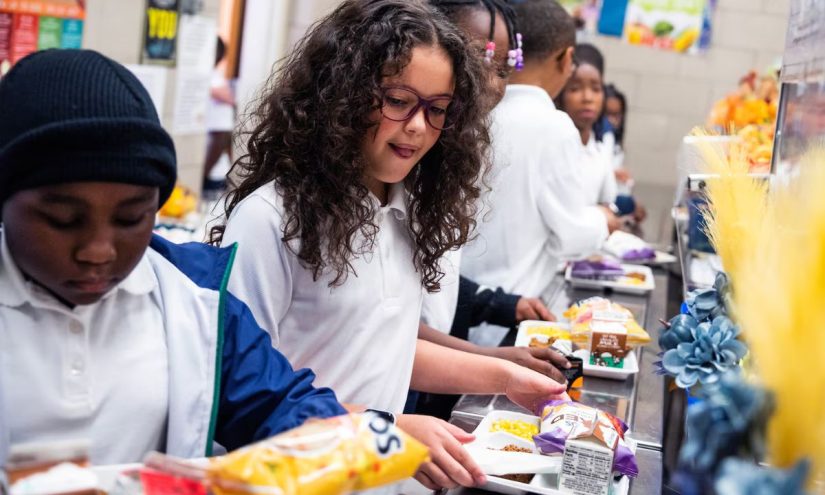When Vevian Nguyen heard the strike of a gong echo for the 10th time, signaling that 10,000 meals had been made, her school cafeteria erupted in applause, and she knew her gloves and hairnet were staying on.
“Every time we hit the gong, it felt like a little pat on the back, like, ‘Oh, you did something good,’” Vevian said. “Now you can keep doing it.”
Within an hour, Vevian and more than 200 students at Laguna Creek High School, a school in the Elk Grove Unified School District in Sacramento County, packed more than 10,000 meals to be donated during the holidays, exceeding their goal for the night. But Vevian, who is a junior and president of Laguna Creek High’s service-oriented Interact Club, said she wasn’t there to simply check off her service hour requirements.
“We want to be involved in our community, which is having to be able to know that you’ve helped a family or at least just one person out there,” the 16-year-old said. “And, I feel like that helps your character, it builds who you are and where you stand within your school and your community.”
The October food-preparing night was part of an international initiative called Rise Against Hunger, which is run by a coalition of student groups such as the National Honor Society and the Rotary International Club. This was Laguna Creek’s second Rise Against Hunger. During the holidays, their 20,000 meals will reach families in Vietnam that were affected by major floods and landslides this year.
Sandi Peterson, a positive behavior intervention support administrator and adviser for the National Honor Society, had helped Vevian prepare for the event throughout the school year. At weekly club meetings, students created infographics and posters, spread the word on social media, and promoted their goal of packing 10,000 meals to every classroom on campus. It was a student-led collaboration and a clear, ambitious objective, Peterson said, that drove hundreds of students to sign up, show up, and lock in.
“Not one student was on their phone; they were all talking to each other, chatting, laughing. Once we heard the 10,000 gong, it was this huge celebration, and then it started moving so fast,” Peterson said. “We were having to hit the gong for 5,000, 6,000, 7,000 (more) all at the same time. These kids, in less than two hours, assembled 20,000 meals.”
Like most schools in California, Laguna Creek has struggled to recover from high rates of chronic absenteeism after the pandemic’s school closures. Many of those students across the state also report a persistent feeling of loneliness and detachment from their school communities. For Cynthia Dettner, an instructor and supervising teacher for the Interact Club at Laguna Creek High, the night of meal-packing also showcased a rare school connectedness among students.
“After the Covid years, where students were often isolated, watching all of these students laugh and smile and build their own character by reaching out to help others, it’s a gift,” Dettner said. “It’s a joy to see them come together and befriend each other.”
On each side of a cafeteria table, students sporting red hairnets and plastic gloves measured and assembled nutritionally balanced portions of dried rice, vegetable protein, vitamin packets, dried tofu and protein additives into pre-labeled bags. They then rotated each bag to teams of students who stapled, heat-sealed, and counted each package to be ready for distribution worldwide.
“It looks almost like a Hallmark movie where you see the cookie factory in progress,” Dettner said. “It’s all kinds of hands and smiles working together, they’re all engaged and involved, and that lifts the community.”
Although Peterson had spent the year raising sponsorship funds for the event, she said the students who packed the meals soon took ownership of the initiative.
“Within two weeks, I had students come up to me and say, ‘Ms. Peterson, maybe if we go around and start collecting money on our own, we could do another one in a couple months,’” Peterson said. “So, now they’re trying to tag-team and do 40,000 meals in our next school year. The ticket to longevity is I know that the kids will always show up.”
Vevian grew up in a low-income family, and after watching friends and family members struggle financially in recent months, she said she’s felt more compelled to help others. Laguna Creek’s new holiday ritual has further motivated her year-round commitment to community service.
“To contain the attributes of a leader, I learned that you have to actually step up and use your voice and really hold yourself accountable,” Vevian said. “If you just make one impact, it can slowly build that momentum for the rest of everyone else to stand behind you.”
Did you use this article in your work?
We’d love to hear how The 74’s reporting is helping educators, researchers, and policymakers. Tell us how



